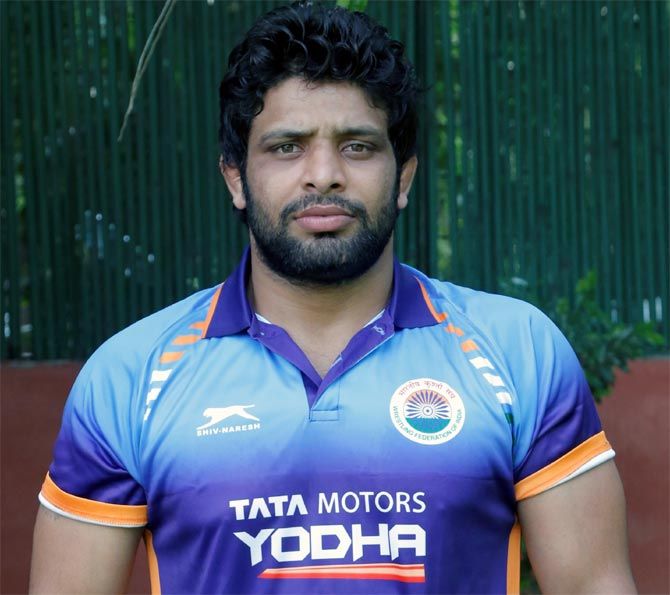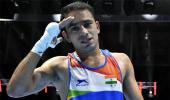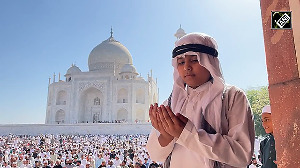
Ravi Dahiya is staring into nothing, sitting in the training arena at Barys Arena with his arms clutching his knees.
Then he quietly discusses something with the coaches.
He has qualified for the Tokyo Olympics after knocking off some established global stars in the 57kg but hardly shows any emotion.
There is not even a smile on his face.
Even when the referee raised his hand after his win over formidable Japanese Yuki Takahashi, he gives an impression as if he has lost.
This was the result, which secured his passage into the Tokyo Olympics.
Then the 22-year-old bumps into Russian world champion Zaur Uguev and suffered a narrow 4-6 defeat to go out of the gold medal race.
"They were scheduling my bouts too close to each other," he says on a memorable day for him but does not utter a word on making it to the Olympics.
He walks out of the stadium, saying he has to look after his weight.
That's Ravi Dahiya for you!
A man of few words but with everything in his arsenal that he needs to have for excelling on the mat.
He won the bronze in 57kg in Nur-Sultan, Kazakhstan, on Friday on his debut at the World Wrestling Championships.
That he possesses extraordinary talent was never in question. He won a silver at the Under-23 World Championships in 2015 to give a glimpse of what is coming in future.
If anyone doubted his potential, he showed his mettle at the Pro Wrestling League when he beat U-23 European champion and also Sandeep Tomar, who literally owned the 57kg category before Dahiya's rise.
There were a few who were still not willing to believe in him, saying PWL was not a platform to judge him.
However, it was this platform which enabled him to make a name for himself.
He, once more, silenced the critics by excelling during the national trails for the Worlds, emerging winner from arguably the most competitive category, which featured Sandeep Tomar and Utkarsh Kale.
Dahiya is a product of the national capital's Chhatrasal Stadium, which has already given India two Olympic medallists -- Sushil Kumar and Yogeshwar Dutt.
He came here from his village Nahri in Harayna about 10 years back when he was just a 12–year-old and since then has been training under Mahabali Satpal and coach Virender.
And anyone who has seen him train, would say that he is a shy person, who does not express himself much.
"What should I say? I am like this since my childhood. My real journey has just begun. What have I achieved? There are Olympic medallists from my training centre. What have I done?," said Dahiya, who idolises Iranian great Hasan Yazdani.
Wrestler Arun Kumar, who has largely mentored him, chips in, "See, this how he has been brought up."
Sushil Kumar says, "You will find all Chhatrasal stadium trainees like this. They are focussed."
It shows on the mat. His possesses remarkable composure, stamina and power. He does not get rattled even when he is trailing by a huge margin.
Against Arsen Harutyunyan, he trailed 0-6 but once he started to attack he finished the bout by logging 17 points in a row against the 61kg European Champion.
The way he controlled the bout against crafty Yuki Takahashi was a treat to watch and it spoke volumes of Dahiya's skill.
His father is a small-time farmer and brings milk and fruits for him every morning from his village about 39kms from his centre.
"I have told him not to bother much but they want me to have pure milk from home."
But his father could not watch his son felling the top stars on Thursday as he had to tend to his paddy field and it was no big deal for Dahiya.
"It's okay if they don't watch. He must be busy with his work. And they don't understand wrestling much," said Dahiya.
If his parents are not so keen on wrestling, how he got into the sport?
"Wrestling was popular in my village. There have been Olympians and a World medallist too. So I was drawn towards this sport. There are about 20 wrestlers at Chhatrasal from my village," he said.
Amit Dahiya, who won a World Championship silver in 2013 in Budapest, also came from the same village and Dahiya is just trying to carry forward the legacy of the place.
Even at Chhatrasal stadium, he lives in a room which belonged to Yogeshwar for some time when he trained there and went on to win Olympic bronze in 2012.
He is carrying forward the legacy of a few but is definitely on the path to create his own.












 © 2025
© 2025